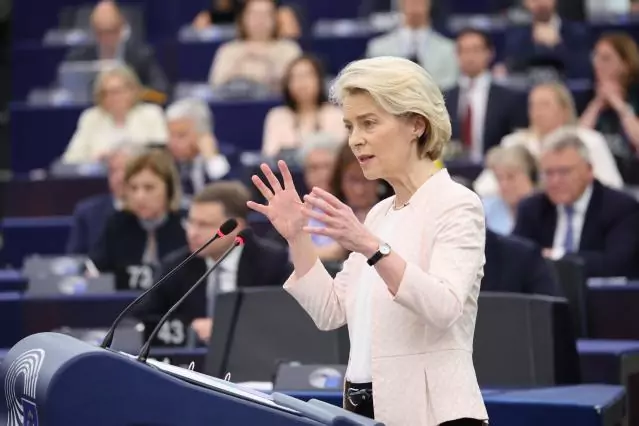European Commission leader Ursula von der Leyen and Parliamentary President Roberta Metsola were both re-elected in Thursday’s EU elections, staving off the far-right to maintain a more centrist rule. It is being hailed as a “major victory for pro-Europeans” but are the centrists’ holding on by their fingernails?
The European Union’s elections saw 720 new lawmakers elected, all of whom are heading to Strasbourg for their opening plenary meeting.
The results showed a growing divide within the European Parliament with two new far-right groups: Europe of Sovereign Nations, who saw 25 members elected to the European Parliament (MEPs), and Patriots for Europe, who had 84 new ministers join, gaining traction. Along with the European Conservatives and Reformists, the make-up of the legislature is now more than a quarter right-leaning.
Despite gains for the far-right, current European Commission (EC) president, the centre-right Ursula von der Leyen, and Roberta Metsola, the conservative from Malta who served as parliamentary president, have both been re-elected, giving the centrists cause to hope their coalition will hold- and hold sway- in the years to come.
“Today is an important day. Today, Europe wins,” said Iratxe García, leader of the Socialists and Democrats, to Euronews. “The pro-European political forces really had a big challenge, a big responsibility, to work together here for this result.”
Von der Leyen’s plans for the future
German Ursula Von der Leyen is clearly attempting to unify the EU, saying in her speech after her reelection, “We are in a period of deep anxiety and uncertainty for Europeans. Families are feeling the pain from the cost of living and housing. Young people are concerned about the planet, their future and the prospect of war. Companies and farmers are feeling squeezed. All of this is a symptom of a world in which everything is weaponised and contested. Where there is a clear attempt to divide and polarise our societies. I am deeply concerned about these trends. But I am convinced that Europe – a strong Europe – can rise to the challenge.”
Outlining her vision for the future, the politician highlighted the need for more private investment, bringing down energy costs, encouraging renewable energy generation, security and defence, managing immigration, and taking an active leadership role in the world, namely in the Middle East to stop the war in Israel and Gaza.
For now, the centre’s alliances are holding firm, but when votes on new legislation begin, the scene could prove more volatile as the far-right flex their newly found muscle and change the face of the EU’s current moderate landscape.
Monaco Life is produced by real multi-media journalists writing original content. See more in our free newsletter, follow our Podcasts on Spotify, and check us out on Threads, Facebook, Instagram, LinkedIn and Tik Tok.
Photo of Ursula von der Leyen source: European Commission
